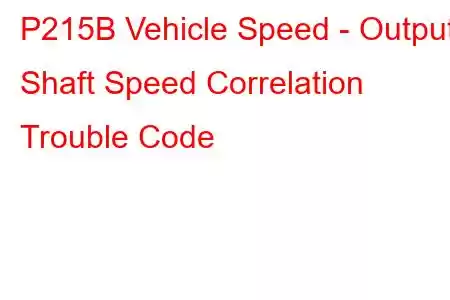P215B Vehicle Speed - Output Shaft Speed Correlation
OBD-II Trouble Code Technical Description
Vehicle Speed - Output Shaft Speed Correlation
What does that mean?
This is a generic diagnostic trouble code (DTC) and typically applies to OBD-II vehicles. Vehicle makes may include but aren't limited to Ford, Chevy / Chevrolet, etc.
If your OBD-II equipped vehicle has stored a code P215B, it means that the powertrain control module (PCM) has detected a discrepancy between the vehicle (output) speed sensor and the output shaft speed sensor.
The vehicle (output) speed sensor and the output shaft speed sensor are both intended to detect vehicle. In the type of system intended to exhibit a code P215B, the vehicle (output) speed sensor is located in the differential and the output shaft speed sensor is situated near the output shaft housing of the transmission (2WD) or transfer case (4WD).
The vehicle (output) speed sensor and the output shaft speed sensor are both electromagnetic sensors which are mounted in close proximity to some type of toothed reluctor ring wheel or gear. The reluctor ring is mechanically affixed to an axle, transmission/transfer case output shaft, ring gear, or driveshaft. The reluctor ring spins in conjunction with the axle. As the reluctor ring teeth pass within thousandths-of-an-inch of the output shaft speed sensor, the magnetic field completes the sensor input circuit. The notches between the reluctor ring teeth create interruptions in the same circuit. These completions/interruptions occur in rapid succession as the vehicle rolls forward. These circuit completions and interruptions create wave form patterns that are received by the PCM (and other controllers) as vehicle speed or output shaft speed. As wave form pattern speed increases, estimated vehicle and output shaft speed increases. Likewise, as the input speed of the wave form slows, estimated vehicle or output shaft speed decreases.
The PCM is constantly monitoring vehicle (output) speed and output shaft speed when the vehicle is moving forward. If the PCM detects a variation between the vehicle (output) speed sensor and the output shaft speed sensor that exceeds the maximum threshold (for a set amount of time) a code P215B will be stored and a malfunction indicator lamp (MIL) may be illuminated.
A transmission speed sensor:
What is the severity of this DTC?
The conditions which contribute to a code P215B being stored may cause incorrect speedometer calibration and erratic transmission shifting patterns. The code should be considered severe and addressed as quickly as possible.
What are some of the symptoms of the code?
Symptoms of a P215B diagnostic code may include:
Erratic speedometer Inadvertent ABS or traction control system (TCS) activation Irregular transmission shift patterns ABS codes may be stored The ABS may be disabledWhat are some of the common causes of the code?
Causes for this P215B code may include:
Incorrect final drive gear ratio (differential ring gear and pinion) Excessive metallic debris on vehicle (output)/output shaft speed sensor magnet Defective vehicle (output)/output shaft speed sensor Transmission slippage Cut or damaged wiring or connectors Broken, damaged, or worn reluctor ring teeth Faulty PCM or PCM programming errorWhat are some P215B diagnostic and troubleshooting steps?
A diagnostic scanner with a built-in oscilloscope, a digital volt/ohmmeter (DVOM), and a source of reliable vehicle information will be needed to diagnose a code P215B.
With a stored P215B, I would make sure that my automatic transmission was full of clean fluid that did not smell burnt. If the transmission was leaking, I would repair the leak and fill it with fluid, then drive it to make sure that it had not undergone mechanical failure.
You will need the vehicle infor
Read: 22


